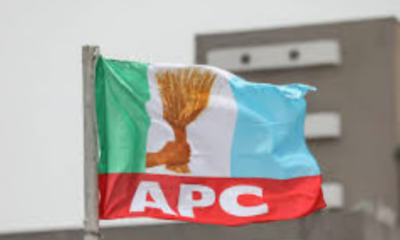Business
The world ahead 2023: Whither Nigeria?
Published
1 year agoon
By
Publisher
By Marcel Okeke
“The World Ahead 2023” is the 2022 end-of-year special publication of ‘The Economist’ (of London) in which the journal reviewed the global economy in the outgoing year and made detailed projections about 2023, including what issues are most likely to dictate the trends in the coming year. It says: “After two years when the (Covid-19) pandemic shaped the immediate future, it is now the Ukraine war.” The journal gave four things to think about for 2023, namely: (1) the impact of the conflict; (2) the struggle to control inflation; (3) chaos in energy markets; and (4) China’s uncertain post-pandemic path. Going granular in it analysis, the publication gave ten themes and trends for 2023—thus: all eyes are on Ukraine; recessions loom; climate silver lining; peak China; divided America; flashpoints to watch (India-China, Turkey-Greece); shifting alliances; revenge tourism; metaverse reality check; and New year, new jargon.
‘The Economist’ publication specifically posits that “the world economy is slowing and many countries risk falling into recession in 2023.” It says tight money has brought about a strong dollar which is exporting inflation to emerging markets and making their hard currency debt harder to service. “Next year (2023) will be about battling inflation and economic stagnation,” the journal sums up. On Africa, the journal says it “is the richest continent in resources but poorest in economic development, and needs to use its endowment of green minerals to build an industrial base.” Observing that “between 2020 and 2022, prices of staple foods in African countries increased by 24%”, the journal added that “higher energy prices have also driven up cost of transportation and fertilizer.”
Unsurprisingly, these observations and predictions largely agree with those of the Monetary Policy Committee (MPC) of the Central Bank of Nigeria (CBN) during its meeting in November 2022. Specifically, at the meeting, the MPC said it was concerned that the global inflationary pressures had continued to trend higher and financial markets were also facing challenges. It observed that this was indeed the trend in Nigeria, with inflation attaining 21.09 per cent in October 2022; and by end-November 2022, the rate had climbed further to 21.47 per cent. In its communique number 145 of November 22, 2022, the MPC observed “the continued weakening of the global economy due primarily to the persistent increase in energy prices, supply chain bottlenecks, rising inflation, looming food crisis, and sharp increase in interest rates leading to frightening external financial conditions.” The MPC observed further that “the volatility of the oil market, driven by policy stance by OPEC + and the US Government, is also creating considerable uncertainty in the market, thus making the overall direction relatively unclear,” adding that “moreover, global trade has dwindled significantly in 2022, with the outlook for 2023 looking weak.” The MPC also noted that global private and public debt portfolios remained high and, in some cases, expanding as several countries around the globe acquire debt to stay afloat.
Specifically on Nigeria, the MPC noted with concern, “the persisting uptick in inflation for the ninth consecutive month…,” pointing out that “the persisting uptrend in energy prices and prolonged period of scarcity of Premium Motor Spirit (PMS), contributed to a sharp rise in transportation, logistics and manufacturing costs, which fed through to consumer prices.” It listed other contributory legacy factors to the inflationary trend to include “the lingering insecurity across the country, perennial flooding in major food producing states, critical deficit of infrastructure in the country, and poor road network, among others.”
All these are clear pointers to the fact that the current and persisting global and local economic headwinds are most likely to spill into year 2023, all things being equal. For instance, as the MPC observed, the rise in inflation for nine consecutive months is not likely to abate or reverse any soon. The causative factors are both internal and external—with many of them beyond the purview/control of the monetary and fiscal authorities of the country. How soon can insecurity and flooding challenges be curtailed to diminish their effects on inflation, for instance? Nigeria has for long remained a largely import-dependent economy—and the status quo has serious negative implications—especially with respect to foreign exchange inflow and management. Currently, Nigeria remains largely a mono product economy, depending largely on crude oil sales for much of its foreign exchange earnings. How soon can this situation change? Granted, the CBN has commenced some serious efforts to shore up the non-oil export proceeds of the country; but the desired result is yet to be achieved.
No wonder, in the MPC communique 145 of November 22, 2022, the Committee “observed the decline in the external reserves position, as gross external reserves decreased by 1.34 per cent at end-October 2022 to US$36.87 billion, from US$37.39 billion at end-September 2022.” The MPC members therefore urged the apex bank to sustain its current policies to boost non-oil exports in order to shore up the external reserves, since there were indications that lower crude oil prices would prevail in the ‘futures market.’
Related to the dropping external reserves are the multifaceted challenges confronting the oil and gas industry in Nigeria: massive oil theft, exit of many big international oil companies (IOCs), vandalism on infrastructure and outright sabotage on critical production facilities, etc. These factors have conspired to make it practically impossible for Nigeria to meet her oil production/sales volume as allocated to her by the Organization of Petroleum Exporting Countries (OPEC) of which the country is a key member. Thus, although Nigeria’s OPEC quota stands at about 1.90 million barrels per day, for several months now, the country’s volume of oil production/sales has been hovering around just one million barrels per day. This translates to a huge loss of (otherwise realizable) foreign exchange months on end; and this trend is most likely to continue in 2023.
Also related to the oil/energy challenge is the albatross and controversial fuel subsidy regime in the country—arising from the almost total dependence of Nigeria on imported refined petroleum products. The higher the price of crude oil in the international market, the higher the prices of the refined products being imported by Nigeria. So, as the country ‘benefits’ from rising oil prices, it loses virtually everything to cost of importation of refined products. And because of the high cost of imported refined products, Government continues to partly bear the burden of the cost to Nigerian consumers—and so, the subsidy conundrum goes on—an entirely opaque process that now gulps trillions of Naira. Unfortunately, the end to this incubus is not in sight.
Allied to this challenge is the huge and rising humongous public debt (local and external), now standing at over N45 trillion. In recent times, Government has been committing over one hundred per cent of its revenue to debt servicing, and borrowing more money to meet many other recurrent (expenditure) obligations. Even as 2022 is fast ending, Government is in a last ditch effort to lessen the debt burden via the securitization of over N23 trillion (of the CBN Ways & Means to 40-year instrument at nine per cent). This is in addition to a feverish move by Government to secure Parliamentary approval for N819.50 billion supplementary budget—a move that is like an additional local loan that would push up total domestic debt to about N22.57 trillion by year-end 2022.
So, in 2023, Nigeria will continue to be confronted with insecurity, high inflation, huge public debt, shortage of foreign exchange, massive unemployment and motely socio-political challenges—especially in the build-up to 2023 general election and its aftermath. As contained in ‘The Economist’ special 2022 year-end publication: “The editors of Collins English dictionary have declared “permacrisis” to be their word of the year for 2022.” And this means an extended period of instability, uncertainty and insecurity—and this, for sure, is the outlook for 2023, especially for Nigeria!
- Mr. Okeke, an economist, sustainability expert and consultant on business strategy, and is a National Daily Columnist. He can be reached via [email protected]
Trending

 Football5 days ago
Football5 days agoGuardiola advised to take further action against De Bruyne and Haaland after both players ‘abandoned’ crucial game

 Aviation1 week ago
Aviation1 week agoNCAA suspends three private jet operators for engaging in commercial flights

 Aviation6 days ago
Aviation6 days agoDubai international airport cancels flights as flood ravages runway, UAE

 Featured3 days ago
Featured3 days agoPolice reportedly detain Yahaya Bello’s ADC, other security details

 Comments and Issues5 days ago
Comments and Issues5 days agoNigeria’s Dropping Oil Production and the Return of Subsidy

 Education4 days ago
Education4 days agoEducation Commissioner monitors ongoing 2024 JAMB UTME in Oyo

 Business4 days ago
Business4 days agoMaida, university dons hail Ibietan’s book on cyber politics

 Featured1 week ago
Featured1 week agoRelationship between Oyetola, Omisore remains cordial — Osun APC

